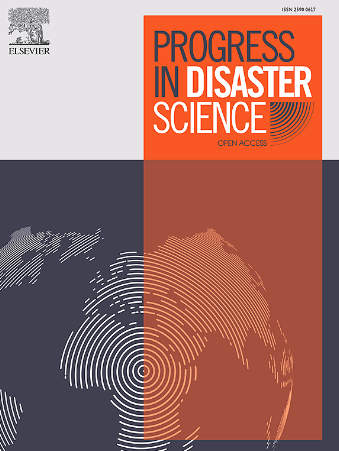孟加拉国沿海渔民对热带气旋的反应
IF 3.8
Q3 ENVIRONMENTAL SCIENCES
引用次数: 0
摘要
沿海社区一般都是在灾害背景下进行研究的。然而,在灾害科学文献中,渔业社区对热带气旋事件的具体反应仍然相对较少。本研究调查了渔民对热带气旋的反应,以及影响他们是否前往气旋避难所的行为决策的各种因素。研究结果表明,渔民的应对机制包括通过自己的主动行动、依赖亲属关系和义务、生计多样化、渔业集约化以及参与社会网络和环境管理来获得日常必需品。调查结果表明,由于各种原因,大约一半的参与者没有在气旋中心寻求庇护。至关重要的是,渔业社区的社会经济和职业地位在很大程度上影响了他们不愿遵守疏散命令。认识到不遵守疏散命令是造成与飓风有关的人员死亡的主要因素,处理和减轻不遵守命令的情况至关重要。要在小规模渔业社区内制定有效的灾害风险管理战略,就需要采取综合和全面的办法,包括跨部门合作。本文章由计算机程序翻译,如有差异,请以英文原文为准。
Fishers' responses to tropical cyclones in coastal Bangladesh
Coastal communities in general have been studied in the context of disaster. However, the specific responses of fishing communities to tropical cyclone events remain relatively under-explored in the disaster science literature. This study investigates fishers' responses to tropical cyclones and various factors that impact behavioral decisions on whether to go to a cyclone shelter. The findings suggest that fishers' coping mechanisms involve securing daily necessities through their initiatives, reliance on kinship relations and obligations, diversification of livelihoods, intensification of fishing, and engagement in social networking and environmental management. The findings suggest that approximately half of the participants refrained from seeking refuge in cyclone centres for various reasons. Crucially, the socio-economic and occupational status of fishing communities significantly influenced their reluctance to comply with evacuation orders. Recognizing non-compliance with evacuation orders is a leading factor in cyclone-related human fatalities and addressing and mitigating non-compliance is essential. Integrated and comprehensive approaches, including cross-sector cooperation, will be needed for effective disaster risk management strategies within small-scale fishing communities.
求助全文
通过发布文献求助,成功后即可免费获取论文全文。
去求助
来源期刊

Progress in Disaster Science
Social Sciences-Safety Research
CiteScore
14.60
自引率
3.20%
发文量
51
审稿时长
12 weeks
期刊介绍:
Progress in Disaster Science is a Gold Open Access journal focusing on integrating research and policy in disaster research, and publishes original research papers and invited viewpoint articles on disaster risk reduction; response; emergency management and recovery.
A key part of the Journal's Publication output will see key experts invited to assess and comment on the current trends in disaster research, as well as highlight key papers.
 求助内容:
求助内容: 应助结果提醒方式:
应助结果提醒方式:


